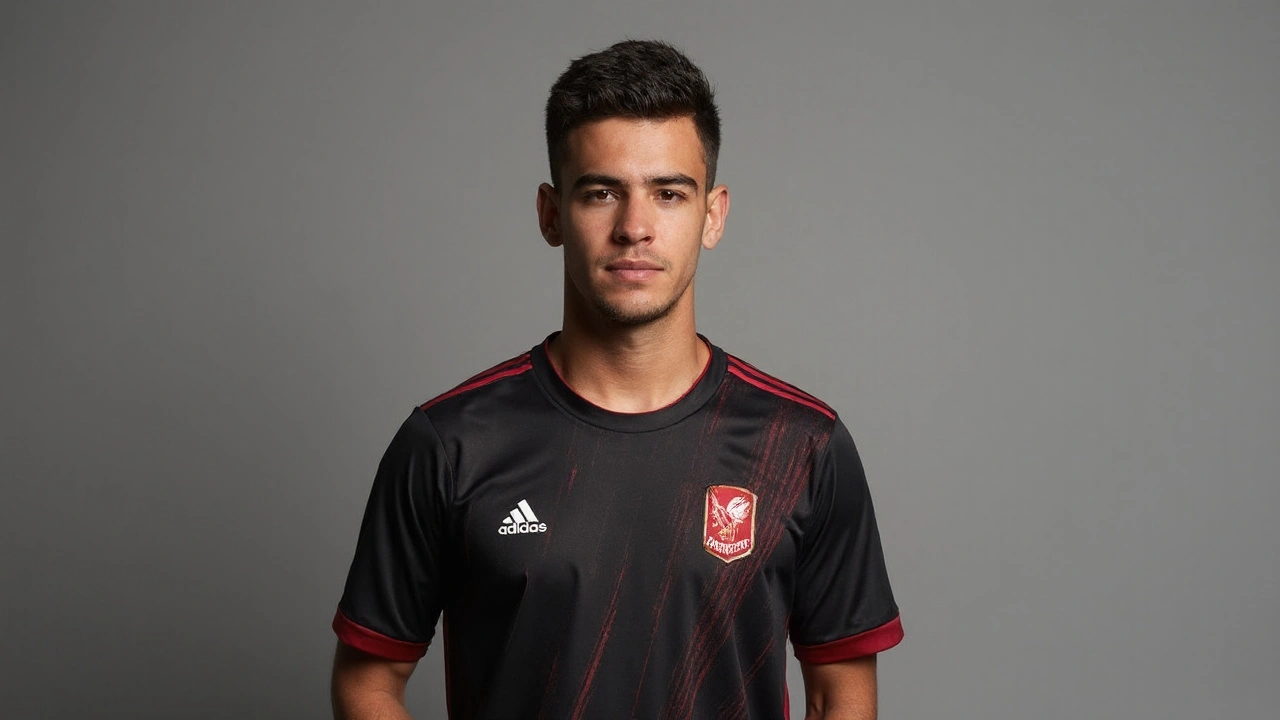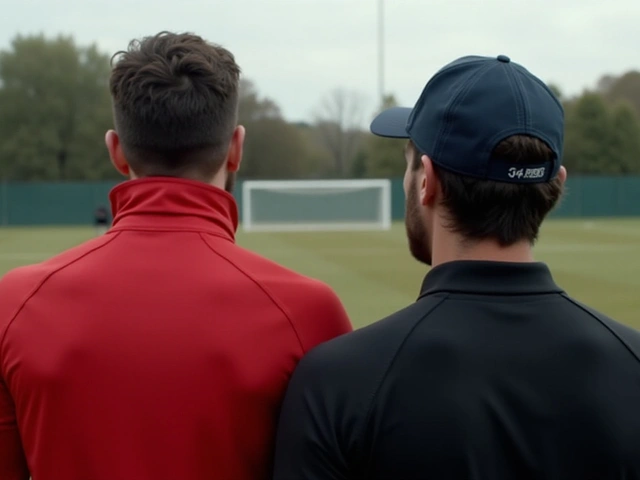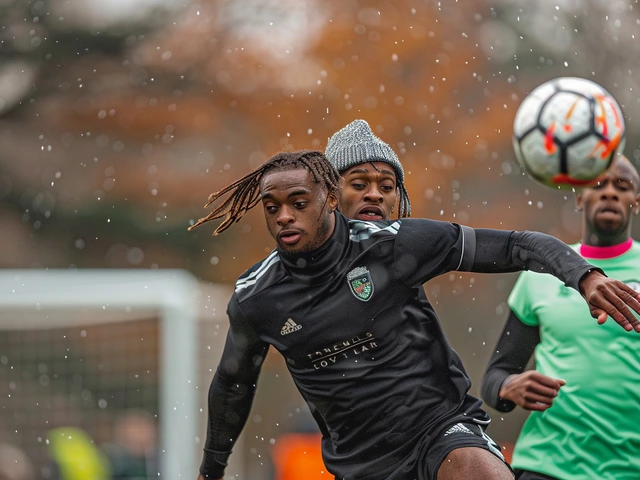Copa Sudamericana Quarterfinal Heartbreak: Fluminense Falls to Lanús at the Maracanã

First Leg Set the Stage
When Lanús walked out of Estadio Ciudad de Lanús with a 1-0 victory, they left Fluminense with a mountain to climb. The Argentine side grabbed the advantage thanks to a clinical finish that left the Brazilian crowd with a sour taste. Going into the second leg, Fluminense knew they had to overturn the deficit while protecting against a counter‑attack that could seal their fate.
Coach Roger, aware of the pressure, opted for an attacking lineup that emphasized possession and wing play. Veteran defender Thiago Silva was tasked with marshaling the back line, while midfielder Martinelli was given freedom to drift between the lines. The stage was set for a classic South American showdown: technical flair versus Argentine grit.

The Drama Unfolds at Maracanã
The atmosphere in Rio’s iconic stadium was electric. Fans in yellow and green filled the stands, chanting and waving flags, eager to see their team roar back into the competition. From the first whistle, Fluminense pressed high, stringing together passes that showcased their trademark technical style.
It paid off in the 20th minute. After a period of sustained pressure, Agustín Canobbio tucked the ball past goalkeeper Fábio, leveling the aggregate score. The roar that followed was deafening; the home crowd believed the comeback was finally within reach.
But the second half took an unexpected turn. A flare launched from the Lanús fan section sparked a skirmish with local police, leading to a lengthy delay. Play was halted for several minutes while security cleared the perimeter, and the interruption added a layer of tension that few had anticipated.
When the game resumed, both sides looked wary. Fluminense tried to regain momentum, but Lanús’ disciplined defensive shape, orchestrated by manager Mauricio Pellegrino, frustrated any clear-cut chances. The Argentine club knew a single mistake could undo their first‑leg lead.
At the 67th minute, the tide turned decisively. 20‑year‑old Dylan Aquino, spotting space just outside the box, struck a low drive that slipped under the advancing Fábio. The goal restored Lanús’ 2-1 aggregate advantage and sent a wave of disbelief through the Maracanã. For Fluminense, it felt like the dream was slipping away just as it had begun to materialize.
Coach Roger responded by bringing on seasoned striker Germán Cano and creative midfielder John Kennedy, hoping fresh legs would unlock a late surge. The substitutions added urgency; the ball moved quicker, and Fluminense created a handful of half‑chances in the final ten minutes.
One of those chances nearly became a fairy‑tale finish. Cano rose for a powerful header in the 89th minute, only for the ball to thump against the woodwork and bounce back into play. The collective gasp from the crowd echoed the heartbreak felt by players who saw the net within reach.
Statistically, Fluminense dominated possession, holding the ball for just over half the match. Their passing accuracy hovered around 84%, yet Lanús’ clinical efficiency—two goals from two shots on target—proved the difference. The numbers highlighted a classic South American paradox: control does not always translate into victory.
Beyond the pitch, the match reignited a broader conversation about Brazilian clubs’ performance on the continental stage. This season, Argentine teams have been the dominant force, with Lanús joining the ranks of clubs advancing deep into both the Copa Sudamericana and the Libertadores.
For Fluminense, the exit will trigger introspection. Their squad, featuring the likes of veteran goalkeeper Fábio and emerging talent Everaldo, showed flashes of brilliance but ultimately fell short when it mattered most. Questions linger about tactical flexibility and mental resilience in high‑pressure environments.
Lanús, on the other hand, celebrate a historic achievement. Advancing to the semifinals marks their best run in recent memory, and the players will cherish the moment as a testament to their perseverance. The Argentine side will now set their sights on a semifinal opponent that will likely be another giant from the continent.
As the stadium lights dimmed and fans filtered out, the night remained etched in memory for both sets of supporters. Rio’s faithful left with a lingering sense of ‘what if’, while Lanús fans embraced a night of triumph that will be recounted for years to come.






Amy Paradise
September 24, 2025 AT 18:16What a roller‑coaster at the Maracanã! Fluminense looked like they were finally turning the tide after that early press, but Lanús just wouldn’t give an inch. The flare incident added a weird pause that seemed to break the momentum. Still, you have to give credit to the Brazilian side for holding 84% possession – that’s not easy. Too bad the finishing didn’t match the rhythm :)
Janette Cybulski
October 4, 2025 AT 00:29Seeing the crowd’s reaction after Canobbio’s goal was priceless. It really felt like the comeback was alive, and the energy in the stadium was electric. I think the coach made a smart move bringing on Cano and Kennedy, trying to inject fresh ideas. Those late chances showed the team’s fighting spirit, even if it didn’t pay off. Hopefully they learn from this and come back stronger.
Mildred Alonzo
October 13, 2025 AT 06:43The match stats tell a clear story – possession isn’t everything. Lanús turned their few chances into goals, which is the hallmark of a disciplined side.
Elizabeth Bennett
October 22, 2025 AT 12:56When you look at the tactical setup, Roger’s decision to go high‑press was brave, but perhaps a touch reckless given the aggregate deficit. The wing play was slick, yet the central areas got clogged by Pellegrino’s compact midfield. Fluminense’s ball retention was impressive, but the lack of vertical penetration left them vulnerable to counter‑attacks. The interruption from the flare probably disrupted their rhythm, making the second half even tougher. Lanús’ low block forced Fluminense to take low‑percentage shots, which ultimately didn’t stick. The substitution of Cano gave a spark, but the timing was a tad late to overturn the deficit fully. Overall, the match highlighted the fine line between aggression and over‑commitment in knockout football.
linda menuhin
October 31, 2025 AT 18:09That last header was heartbreak in a nutshell.
Jeff Abbott
November 10, 2025 AT 00:23Typical Brazilian over‑confidence, think they’re untouchable until reality hits.
Quinton Merrill
November 19, 2025 AT 06:36Totally get why the fans were on edge after that flare incident 😅. It’s crazy how security lapses can swing the vibe of a whole match. Still, Lanús kept their cool and showed why Argentine clubs dominate lately. Fluminense’s possession was nice, but they need sharper finishing in big games. Let’s hope they sort out the mental side for the next round! 🙌
Linda Lawton
November 28, 2025 AT 12:49Ever notice how the media always praises the big clubs and pretends everything is fine? The truth is there’s a hidden agenda pushing the narrative that Brazilian teams are always superior. Meanwhile, they ignore the fact that security lapses like the flare are just the tip of the iceberg. It’s all part of a larger scheme to keep fans distracted while the powers that be profit. And don’t get me started on the refereeing – it’s always skewed to favor the home side, even when they’re clearly outplayed. The whole thing feels staged, like a drama meant to keep us watching. You can’t trust the official stats either; they’re just a smokescreen. In the end, it’s all about control, not sport.
Ashley Bradley
December 7, 2025 AT 19:03Watching the second leg at the Maracanã was like witnessing a micro‑cosm of South American football’s eternal struggle between flair and pragmatism.
From the opening whistle, Fluminense seemed determined to rewrite the narrative, pressing high and moving the ball with an elegance that reminded me of past golden eras.
Yet, Lanús, under Pellegrino, reminded everyone that discipline and efficient use of chances can outshine even the most beautiful possession.
The flare incident added an unexpected theatrical intermission, almost as if the stadium itself was taking a breath before the final act.
When Canobbio’s strike leveled the aggregate, the roar from the crowd felt like a collective exhale, a moment of hope that the tide could turn.
But football is merciless; the 67th‑minute goal from Aquino ripped that hope apart, reasserting Lanús’s strategic superiority.
Roger’s tactical tweaks, bringing in Cano and Kennedy, injected fresh energy, but the clock was not on their side.
That near‑miss header in the 89th minute epitomized the thin line between triumph and heartbreak.
Statistically, Fluminense’s 84% passing accuracy showcases a mastery of ball control, yet the conversion rate tells a different story.
Such a disparity highlights a recurring paradox: dominance in possession does not guarantee victory when faced with a well‑organized defense.
Beyond the pitch, the match fuels the ongoing debate about Brazilian clubs’ ability to compete on the continental stage against Argentine perseverance.
Lanús’s advance to the semifinals underscores a shift in power dynamics that could reshape future tournaments.
The emotional residue of this encounter will linger with Fluminense supporters, a lingering ‘what‑if’ that will fuel future discussions.
For the Argentine side, this win cements a narrative of resilience and tactical acumen that will be celebrated for years.
In the end, the night was a reminder that football is as much about mental fortitude as it is about technical skill.
Joe Delaney
December 17, 2025 AT 01:16Great analysis lots of points well said
Ruben Vilas Boas
December 26, 2025 AT 07:29Totally agree with the vibes here – Fluminense gave their all but luck wasn’t on their side. Let’s see how they bounce back next season.